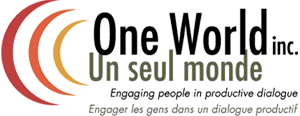How Theory of Change Helps Organizations Address Complex Social Issues
 Like a roadmap guides motorists through unfamiliar territory to reach the final destination, there are effective tools that can help organizations to better navigate the complex environments in which they work, and guide the development of successful initiatives. And just as a map is altered as landscapes evolve, so too should the tools used to help us understand complex issues.
Like a roadmap guides motorists through unfamiliar territory to reach the final destination, there are effective tools that can help organizations to better navigate the complex environments in which they work, and guide the development of successful initiatives. And just as a map is altered as landscapes evolve, so too should the tools used to help us understand complex issues.




 Perhaps many of us don’t think about how easy it is to push open the correct door to the washroom in a crowded building. The truth is, for those who are not physically, visually or hearing impaired, the world around us makes sense. The recent HRSDC conference on the Rights of Persons with Disabilities shed light on just how challenging the world can be for the millions of people living with a disability and the importance of creating environments to accommodate them. Is it a societal issue and
Perhaps many of us don’t think about how easy it is to push open the correct door to the washroom in a crowded building. The truth is, for those who are not physically, visually or hearing impaired, the world around us makes sense. The recent HRSDC conference on the Rights of Persons with Disabilities shed light on just how challenging the world can be for the millions of people living with a disability and the importance of creating environments to accommodate them. Is it a societal issue and  In today’s political, social and economic climate, there’s a real need to build competency in designing and
In today’s political, social and economic climate, there’s a real need to build competency in designing and  Much can go wrong during a
Much can go wrong during a  Developmental evaluation can be especially useful in helping to deal with complex issues where more conventional approaches to evaluation fall short. It is a way to support the development and testing of creative approaches to address complex problems; it is well-suited to those situations where you are “learning as you go”.
Developmental evaluation can be especially useful in helping to deal with complex issues where more conventional approaches to evaluation fall short. It is a way to support the development and testing of creative approaches to address complex problems; it is well-suited to those situations where you are “learning as you go”. Mention the word facilitate to people and it can stir up multiple images such as; teachers and blackboards, a conductor with baton in hand, or just someone making things happen. In fact a facilitator is a type of enabler and to a company undergoing major change, an NGO needing to re-align their vision and programming directions, a multi-interest group working to find new ways to address a pressing issue, and others, a facilitator can be an invaluable asset to draw upon. A skilled facilitator can help spark new ways of thinking and innovation, guide informed and effective decision-making, and bring out the best in people, an organization or a collective.
Mention the word facilitate to people and it can stir up multiple images such as; teachers and blackboards, a conductor with baton in hand, or just someone making things happen. In fact a facilitator is a type of enabler and to a company undergoing major change, an NGO needing to re-align their vision and programming directions, a multi-interest group working to find new ways to address a pressing issue, and others, a facilitator can be an invaluable asset to draw upon. A skilled facilitator can help spark new ways of thinking and innovation, guide informed and effective decision-making, and bring out the best in people, an organization or a collective.